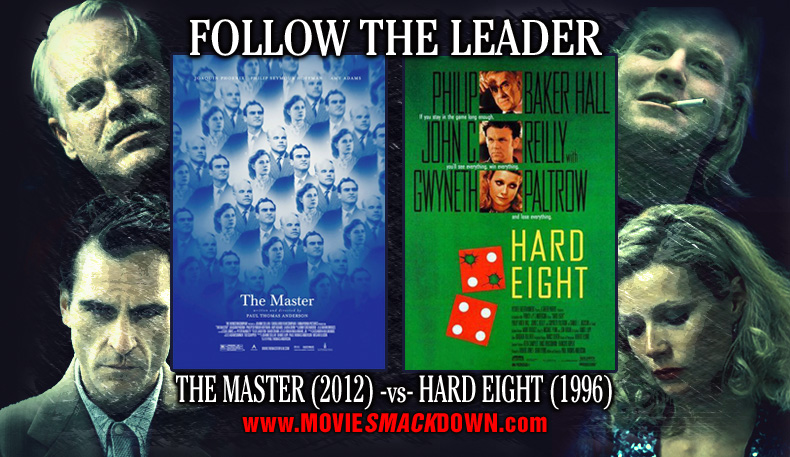
The Smackdown
A seemingly wise, benevolent middle-aged figure adopts a temperamental loser as a surrogate son of sorts, resulting in a lengthy, complicated and volatile relationship. This is the main basic storyline for at least two of writer-director Paul Thomas Anderson’s six features, including his debut Hard Eight (1996) and his latest release, The Master, not to mention one of the dozen or so plot threads in his cult-classic porn epic, Boogie Nights (1997). Father-son relationships also dominate his one-day-in-the-Valley omnibus, Magnolia (1999), and his previous effort, the one-of-a-kind oil saga, There Will Be Blood (2007).
What we’re getting at here, then, is that however much he’s advanced as a filmmaker over the years, the dude’s evidently still got some daddy issues. But how much has he advanced as a filmmaker? It’s a first-vs.-last Smackdown today as we reach all the way back to the mid-90’s to find a movie brave enough to face down this highly anticipated newcomer.
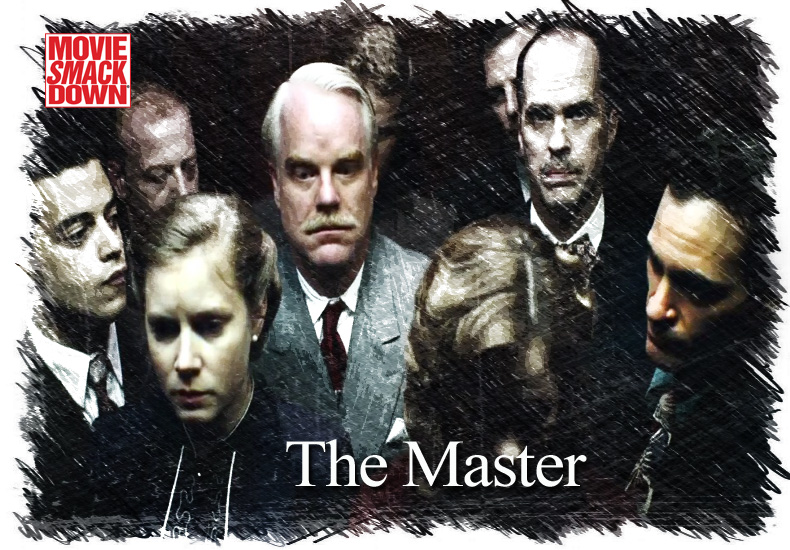 The Challenger
The Challenger
Set in the early 1950’s, The Master refers, as you may have heard, to an L. Ron Hubbardesque figure named Lancaster Dodd (Philip Seymour Hoffman). Dodd is an elegant charmer who heads a sort of self-help cult that abides by the Cause, an odd mix of hypnosis, intense therapy sessions and sci-fi mumbo-jumbo that he is quite probably making up as he goes along. As Anderson was undoubtedly compelled to assure us by some very intimidating lawyers, none of this is at all based on Scientology (Insert winky emoticon here).
Into this unusual family wanders Freddie Quell (Joaquin Phoenix), a rage-filled, sex-obsessed, alcoholic drifter who is clearly messed up from his experiences in the war, though what we later learn about him suggests that he was pretty messed up from the get-go. Dodd takes an instant liking to Quell and recruits him on the spot, first as a sort of moonshine-making mascot, and then as a devoted follower and unofficial “heavy,†a role that suits his hair-trigger temper and violent impulses a bit too well.
Before too long, the relationship disintegrates, as Dodd turns out to be somewhat less masterful and Quell less reformable than either man expected.
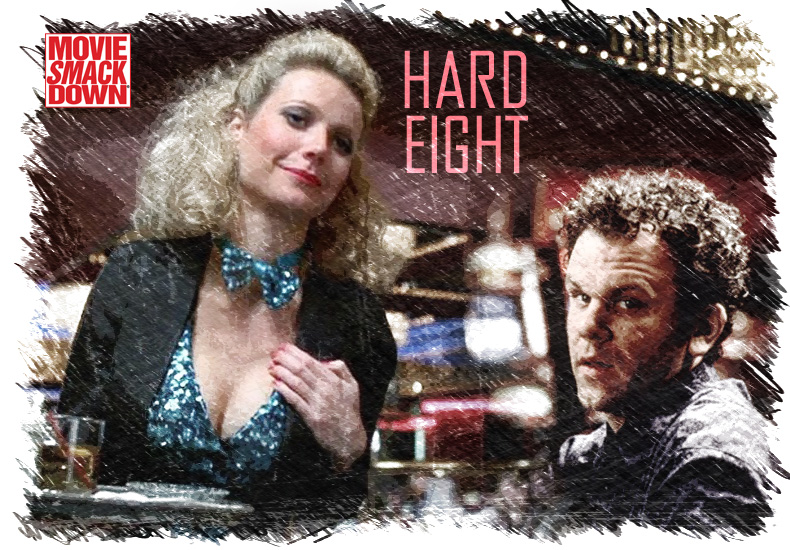 The Defending Champion
The Defending Champion
We have Hard Eight to thank for, among other notable achievements, giving the great Philip Baker Hall the visibility he’d so long deserved with the meaty starring role of Sydney (the film’s original title), an aging, world-weary but gentlemanly gambler, who encounters penniless loser John (John C. Reilly, young and surprisingly slender) at a coffee shop and decides to help him get his life back on track, for reasons we don’t learn until later.
Two years later, in Reno, their odd paternal-ish friendship is disrupted by the intrusion of Clementine(Gwyneth Paltrow), a dim-witted cocktail waitress and part-time prostitute who catches John’s eye, and Jimmy (Samuel L. Jackson), a sleazy friend of John’s with his own agenda. Sydney’s feelings for John are tested when John and Clementine bumble into a tricky situation and beg for his help, and again when Jimmy attempts to blackmail Sydney to maintain his silence about a long-buried secret involving John’s real father.
Future Anderson regular Hoffman even shows up briefly as an obnoxious craps player with a white-trash accent and a truly awful mullet.
The Scorecard
Love him or hate him, one must concede this about P.T. Anderson: Unlike many indie filmmakers who parlayed success from a personal project with a unique vision and voice into a lucrative career of churning out soulless blockbusters, he never “went Hollywood.†If anything, Anderson’s films, while expanding their budget, have grown steadily less conventional and more challenging, these last two so much so that they seem to be practically daring audiences to like them.
Like There Will Be Blood, the new film has an extremely unsympathetic protagonist who grows increasingly unhinged and repellent; a meandering plot that makes the movie feel even longer than its two-hours-plus running time; character motivations and relationships that defy all logic; unusually protracted sequences and long takes; and distractingly dissonant Jonny Greenwood music underscoring practically every scene.
Hard Eight, by comparison, is a model of efficiency, restraint and expert storytelling. Anderson’s direction is confident without being showy, and his writing, while frequently flaunting an obvious David Mamet influence (Sydney says, “Do you hear what I’m saying? Listen to me…†and then repeats his previous line so many times, it could be a drinking game), is smart, stylish and nuanced. As with all of his films, each shot is beautifully framed by the great Robert Elswit. What it also shares with the others, including The Master, is an outstanding acting ensemble. Hall calmly and majestically holds our attention throughout, his dialogue simple and straightforward, while his sad, pained eyes speak worlds, and he and Reilly play off each other beautifully. Jackson is electrifying in a small but memorably nasty role not far removed from his Oscar-nominated turn in Pulp Fiction. And Paltrow, worlds away from pretty much anything else she’s done, turns out to give good floozy.
The Master is impressively acted as well, featuring distinctive work from two of our finest actors: Hoffman gives Hubb… uh, Dodd a Charles Foster Kane-like grandiosity, pseudo-intellect and charm that make it believable how Quell and so many others could fall under his spell. The larger and flashier role is actually Phoenix’s, and he commits to it admirably, giving Quell a stoop-shouldered walk, speaking in a bizarre, drawling mumble through his half-clenched teeth, and going repeatedly into fits of rage that erupt through every inch of his frame. It’s an exhausting performance, and when he and Hoffman are playing directly off each other, particularly in their first “session,†it makes for truly mesmerizing theater.
But the bad news: There are nowhere near enough scenes like that, nor are there any other ingredients that are generally considered vital to the makeup of a good movie. Very little actually happens in it, and we’re given even less reason to actually care what happens to either of these guys, or about their puzzling relationship. Phoenix is a weird, volatile drunk from beginning to end; we can’t fathom what Dodd sees in this guy, or why he’d be willing to alienate his wife (Amy Adams, excellent in a too-small role) and family just to keep him around. At times, the movie can’t be bothered to make even the most basic sense of the friendship. In one scene, Dodd and Quell are screaming at each other through the bars of a jail cell; then in the next, they’re bear-hugging and wrestling like long-lost pals.
That the movie clearly has no actual interest in Hubbard or Scientology, other than as a backdrop for this character study, is disappointing but would be forgivable if the thing were any fun — if it had the jazzy, weirdly hypnotic flow of Magnolia and Boogie Nights, or even the quiet, low-key noirish charm of Hard Eight. Instead, The Master learned all the wrong lessons from the shower of critical adulation Anderson received for TWBB. If you’re among that film’s many fans, feel free to ignore me on this: I found it tedious, pointless and over-wrought, but at least it had that delirious, instant-classic final scene to recommend it. This one just runs out of steam and sputters to a halt.
Hard Eight ends rather abruptly as well, and damned if I could tell you what the point of it is, but it’s a compelling story about (relatively) sympathetic characters and captures the seediness of Las Vegas and Reno, and the gambling life in general, in a way that few films have. Revisiting it after so many years, I was pleasantly surprised not only by how well it’s held up but by how much of it had stayed with me all this time. Whereas, to reflect on The Master is to mainly recall one scene after another of Phoenix attacking someone who dares badmouth the Almighty Dodd. And how aggravatingly disappointing the whole mess is.
The Decision
I don’t doubt The Master will amass a devoted legion of fans and garner some year-end critical plaudits and Oscar nominations, just as its predecessor did, but from where I sit, both emperors are stark naked. Hard Eight is no masterpiece, but it’s a nifty little noir that shows the promise Anderson delivered on in Boogie Nights and especially Magnolia. It stands as a time capsule of several current stars in juicy early roles and one of our best actors in one of his finest, and it marks one of the great writing-directing debuts of recent years. It received a feeble theatrical release and is not the most available DVD out there even after Anderson’s higher profile successes, but it deserves to be sought out. I won’t go so far as to say The Master is a disaster, but our winner, Hard Eight, is clearly the better bet.

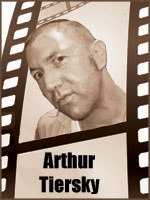



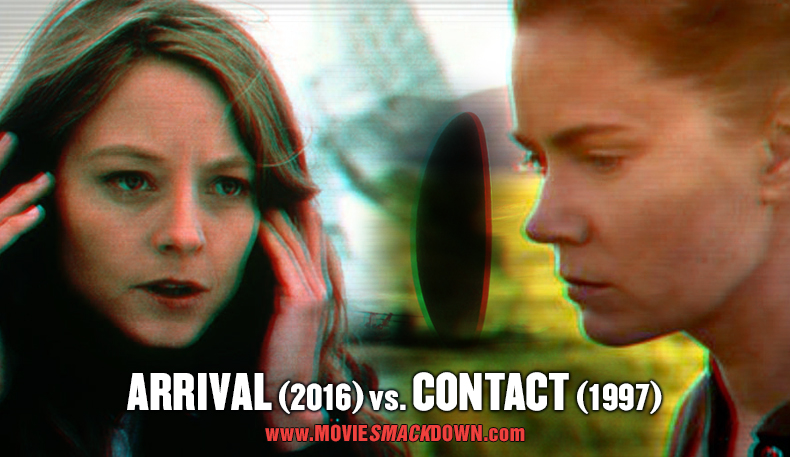
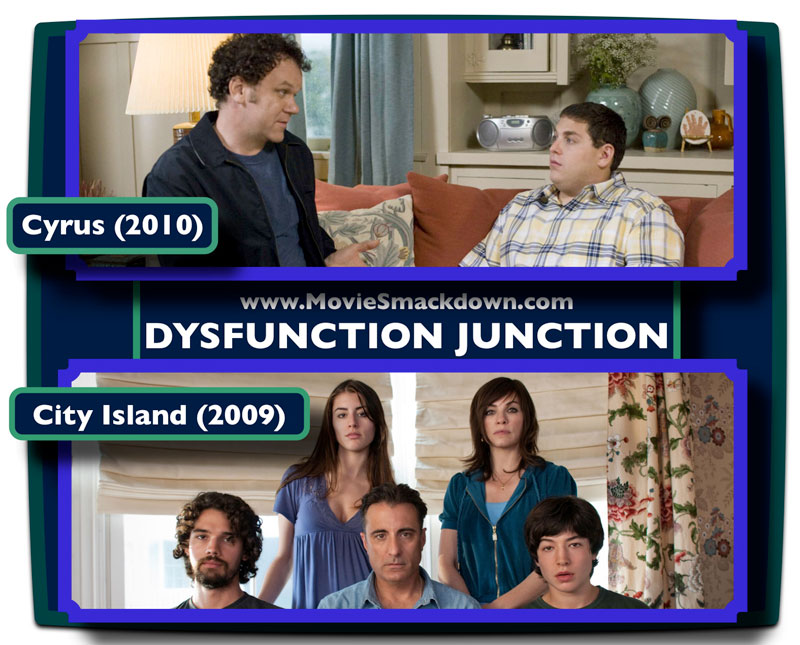
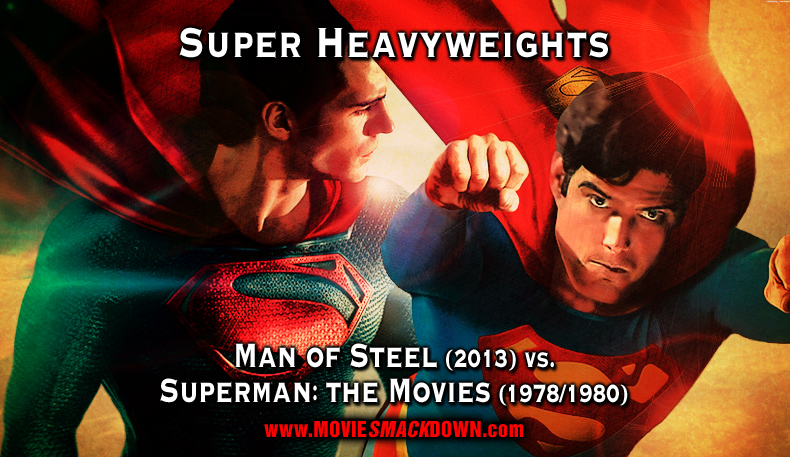
Bryce, it seems that you and Arthur weren’t the only ones not impressed by The Master:
A cult classic? Never! Based on the story of Scientology, The Master is topped for Oscar glory… but CHRIS TOOKEY refuses to be brainwashed
Three of us went to see The Master last night and all of us left the theater numb, confused and worn out. I would have liked a story. Or a real relationship between anybody. This film acts like it’s going to be about something but it’s as lethargic and odd as Tree of Life but even more frustrating. Pass. Still going to see Hard Out as I like Magnolia and Boogie Nights. Really nicely written analysis, Art.
Thanks, Bryce. I honestly haven’t talked to anyone who liked it yet. I think Anderson’s trying to be Kubrick these days and challenge the conventional rules of storytelling, but…He ain’t Kubrick. But if he WERE Kubrick, “Hard Eight” would be his “The Killing.”
Now you have me wondering what a Jonny Greenwood score would have sounded like in “Hard Eight.” Great decision, BTW.
One correction on this one:
“As with all of his films, each shot is beautifully framed by the great Robert Elswit.”
Apologies, in that all of Anderson’s films were filmed by Elswit EXCEPT “The Master”, which was shot by Mihai Malaimare Jr. All of Anderson’s films ARE beautifully shot, though.
Surprising decision. Looking for Hard Eight now.